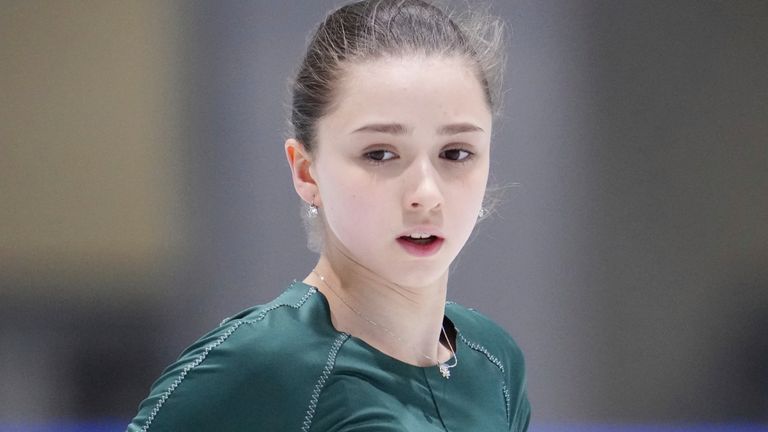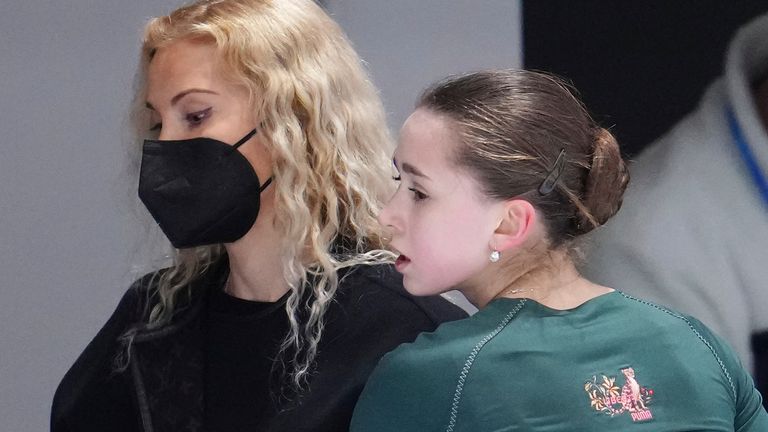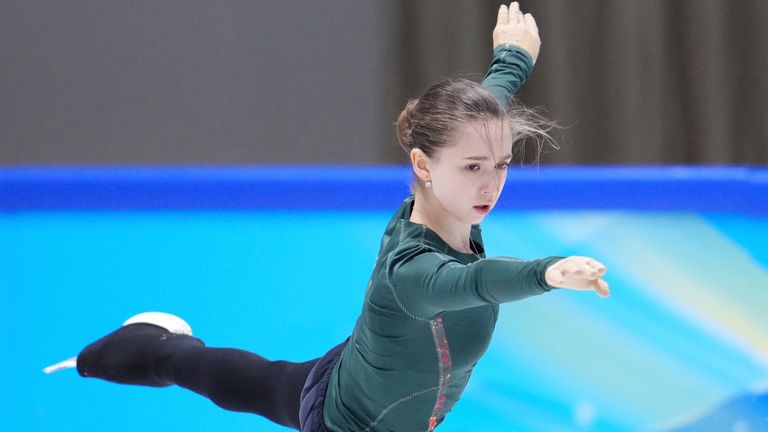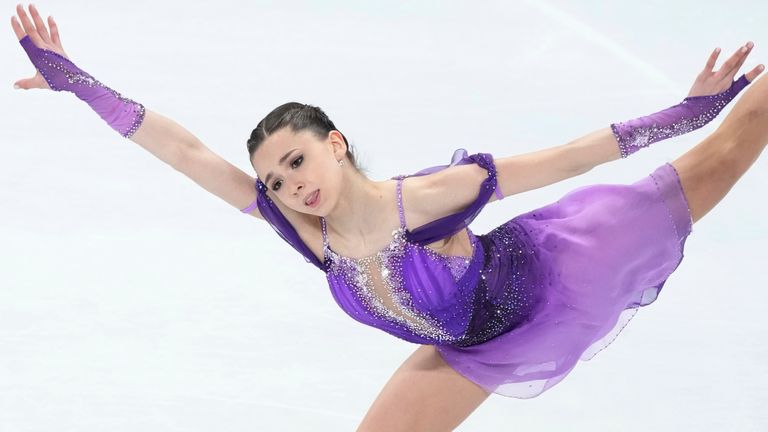Kamila Valieva: IOC welcomes investigation of Russian figure skater's entourage as 15-year-old awaits CAS decision at Winter Olympics
Valieva tested positive for a banned heart medication on Tuesday, one day after winning gold in the figure skating team event; the Court of Arbitration for Sport will hear appeals against a decision to lift a provisional suspension and enable her to continue to compete
Saturday 12 February 2022 16:59, UK
Russian figure skater Kamila Valieva will find out Monday if she can skate in the Winter Olympics women's competition, which starts a day later.
The Court of Arbitration for Sport (CAS) announced on Saturday that the expedited hearing on Valieva's doping case will be held Sunday night in Beijing, with a ruling by Monday afternoon - one day before the scheduled women's figure skating competition.
Valieva tested positive for the banned heart medication trimetazidine on Tuesday, one day after starring in the Russian Olympic Committee's (ROC) victory in the figure skating team event, for which the medals have yet to be awarded.
CAS will hear separate appeals from the International Testing Agency (ITA) and the World Anti-Doping Agency (WADA) against a decision by the Russian Anti-Doping Agency (RUSADA) to lift a provisional suspension and enable her to continue to compete.
Valieva once again practised at the training hall in Beijing on Saturday, spending around 45 minutes on the ice, at one point pausing and appearing to be in tears as she shared a lingering embrace with her controversial coach, Eteri Tutberidze.
Trending
- Transfer Centre LIVE! Trent, Rashford, Olmo latest
- Papers: Barcelona target Spurs captain Son
- Amorim 'mad' as Man Utd show fight | Bruno: Why can't we do this every week?
- Liverpool latest: Slot needs to sign a left-back - Carra
- 'What is VAR doing?' | Brighton's 'controversial' penalty analysed
- Man Utd latest: Amorim's side must back up Liverpool performance - Keane
- Carra: Real bid affected TAA | Nev: 'He looks like he wants to explore Madrid'
- Arsenal latest: Rodgers criticises Celtic fans for Tierney chants
- One of the games of the season! Man Utd hold Liverpool in pulsating encounter
- 'Real bid was insulting!' - Nev, Carra, Keane and Sturridge debate Trent saga
In a move that appears to be aimed at easing the intense media pressure surrounding the teenager, both RUSADA and the International Olympic Committee said on Saturday that they are broadening the focus of their investigations to include members of Valieva's team.
RUSADA said in a statement: "Since the athlete as is a minor, RUSADA launched a probe in regard to the staff of the figure skater.
"The prime aim of this investigation is to reveal all details of possible violations of anti-doping rules in the interests of 'a person in defence."'
The IOC continued to deflect the majority of questions relating to the issue on Saturday, citing the ongoing process, but its communications chief Mark Adams did mirror the RUSADA statement by implying it may be appropriate to look into those behind Valieva's career.
"The IOC would welcome an investigation into the entourage in all cases where it's relevant," said Adams.
"We've strengthened WADA, they have an intelligence and investigation unit. We would very much encourage this in all cases. The entourage in the past has been overlooked... in this case as in all others we would welcome a strong line from them on that."
One of the key figures is Valieva's coach, Tutberidze, whose Sambo-70 club in Moscow has churned out champions including 2018 gold medallist Alina Zagitova, but which has also been strongly criticised for the number of career-threatening injuries afflicting its skaters.
Tutberidze is in Beijing with Valieva, and told Russia's Channel One: "I am absolutely sure that Kamila is clean and innocent. I do not know who decides what, but I hope that justice will somehow prevail."
Valieva submitted her positive test during the Russian Championships on Christmas Day. RUSADA claims the delay in acquiring the results related to a Covid outbreak at the Stockholm laboratory responsible for analysing the sample.
Judge in Valieva hearing worked on Sharapova case
The panel for the video-link closed hearing was chosen by CAS from a select group of nine judges made available for special duties at the Beijing Olympics.
The three-judge panel will consist of chair Fabio ludica of Italy and arbitrators Jeffrey Benz, of the United States, and Slovenian Vesna Bergant Rakocevic.
Benz, a former elite figure skater, was once picked by Maria Sharapova's legal team for her appeal after testing positive for the banned heart medication meldonium at the Australian Open in 2016.
CAS ruled Sharapova was not entirely at fault and her ban was cut to 15 months.
Neither side in the Valieva case was allowed to pick a preferred judge as they would in a typical case outside the Olympics.
Pound: Russia may need Olympic timeout
Russia may need an Olympic "timeout" as doping issues resurface, senior IOC member Dick Pound said.
Russian athletes at the Beijing Games are already not competing under their flag while carrying the Russian Olympic Committee (ROC) on their uniforms, and their anthem is not being played at any ceremonies, following sanctions imposed for the widespread doping across many sports exposed after the Sochi Games.
"At a certain point if they are absolutely incorrigible you end up with the position of take a country timeout," said Pound in a phone interview from Florida. "We could say we can help you. You got a problem. We can concentrate on it. Take a time out for one or two, or three Olympic Games until you get this under control."
Russia has acknowledged some shortcomings in its implementation of anti-doping rules, but denies running a state-sponsored doping programme.
"The Russians don't help themselves because they have been absolutely unrepentant," said Pound. "They won't admit anything, they appeal every single decision."
"I think the approach probably has been too lenient to allow them to compete as the Russian Olympic Committee."
Valieva's failed drug test has reawakened global anger over Moscow's doping history and outrage over how a minor came to have a prohibited drug in her system.
"There are all kinds of things going on and I'm sure the Russians have lawyered up and are trying anything and everything to control the damage," said Pound. "But how could you have possibly exposed her to that risk.
"This is not like a tainted supplement this is a non-therapeutic use of a fairly potent drug."
Pound said efforts to work with Russia and appease them have not worked and a different approach to the problem may be necessary.
"It's sort of appeasement, I forget who described it this way but appeasement is sort of like feeding the alligators and hoping you will be the last one they eat," he said.





